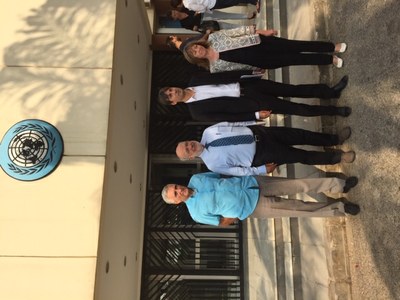Lebanon, a personal view
2018/09/30
The mission had several aims: to get knowledge of the situation in Lebanon, the impact of Syrian refugee crisis in the country and Lebanon-EU relationships directly from the different stakeholders; civil society agents, NGOs and Lebanese authorities.
Some data on Lebanon
1- There were parliamentary elections last spring, but no government agreement still and this situation could last long. A complicated political and administrative structure based on religious believes. 18 different confessions and 16 different civil codes! Constitutionally the president is always a Christian, the prime minister Sunni muslin and the speaker of the parliament Xia muslin. These posts and the leadership of the different confessions are often inherited from father to son and, even, to grandson.
2- Terrible environmental problems. Bad quality water, no proper waste collection scheme (there is not neither a national waste strategy nor a collecting system; some private agents; waste deposited anywhere sometimes directly into the sea), constant electricity cuts, no public transport, …
3- Very high social gap. 1,5 million of Lebanese are vulnerable or live under poverty; 1 in four! The budget of the Social Affairs ministry is only % 1 of the total budget. The economical crisis is degrading the welfare of medium class. In a country where 70 % of the pupils go to private education, more and more medium class families are pushed to send their children to public schools, where two shifts has been established to cope with the increase of pupils due to both more Lebanese children and the arrival of Syrian refugee children.
4- About 250.000 Palestinian refugees who came in 1948. They live in 12 refugees camps which govern themselves, they don´t have the right to work in more than 40 professions and their needs (education, health, …) are provide by the UNRAW and NGOs.
5- 1,5 to 2 millions Syrian refugees (34.000 Palestinian). Seems that even now the situation in Syria is transforming more are coming in than going out. Only, 20 % of them have a legal status in the country. They have no refugee status because Lebanon didn’t sign the Convention of 1951. They are treated as migrants and registered as so. As a consequence the Lebanese authorities don’t feel any need of providing any social support to them. They only can’t work, if they get to be registered (an colossal task!) in building jobs, agriculture and domestic work. They don’t live in organised camps. Instead, they shelter in tents in scattered plots, where they don’t have facilities, and they have to pay a rent to the owner. They fully relay on foreign help.
6- 78 % of Syrian refugees are women or children:
- 76 % live bellow the extreme poverty line
- 4,8 % of boys and girls under 17 are working
- 22 % of girls aged between 15 and 19 are married. Girls are married as young as 12.
- High level of domestic violence
7- Xenophobia is growing among Lebanese population. They have the fear that with Syrian refugees would happen as with Palestinian: they came, but they didn’t return to their homeland.
8- Corruption is a very big issue.
9- Prostitution and drugs arose in a couple of meetings. But they are taboo topics even Lebanon is one of the biggest hashish producer in the World.
10- The social net of a person is almost entirely in dependence of the confession he/she belongs. You can’t be only Lebanese, you must be X Lebanese, referring X to one of the confessions. And the kind of relationship you have with the leaders of the confession marks your position in life and your prospects to improve.
UNRWA and Palestinian refugees
UNRWA is UN agency for Palestinian refugees. It is in a big crisis after the decision of USA of giving up to its funding. Even other donors, mostly European, have decided to increase their contributions, UNRWA is very short of funds and they could be bankrupted by the end of September or October. Palestinian refugees depend almost entirely in UNRWA’s help. UNRWA thinks that the last goal of the US’ move it to end with the refugee status of Palestinian and to put an end to UNRWA.
The situation is critical and the EU should take the leadership to tackles the issue.
As a final and personal conclusion I could define what I learned on Lebanon by either of these two definitions: it is a quasi-failed state with lack of reliable governance or it is a feudal state disguised with democratic clothes (elections).
Anyway, Lebanon is a fantastic place worth to visit!




